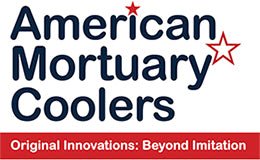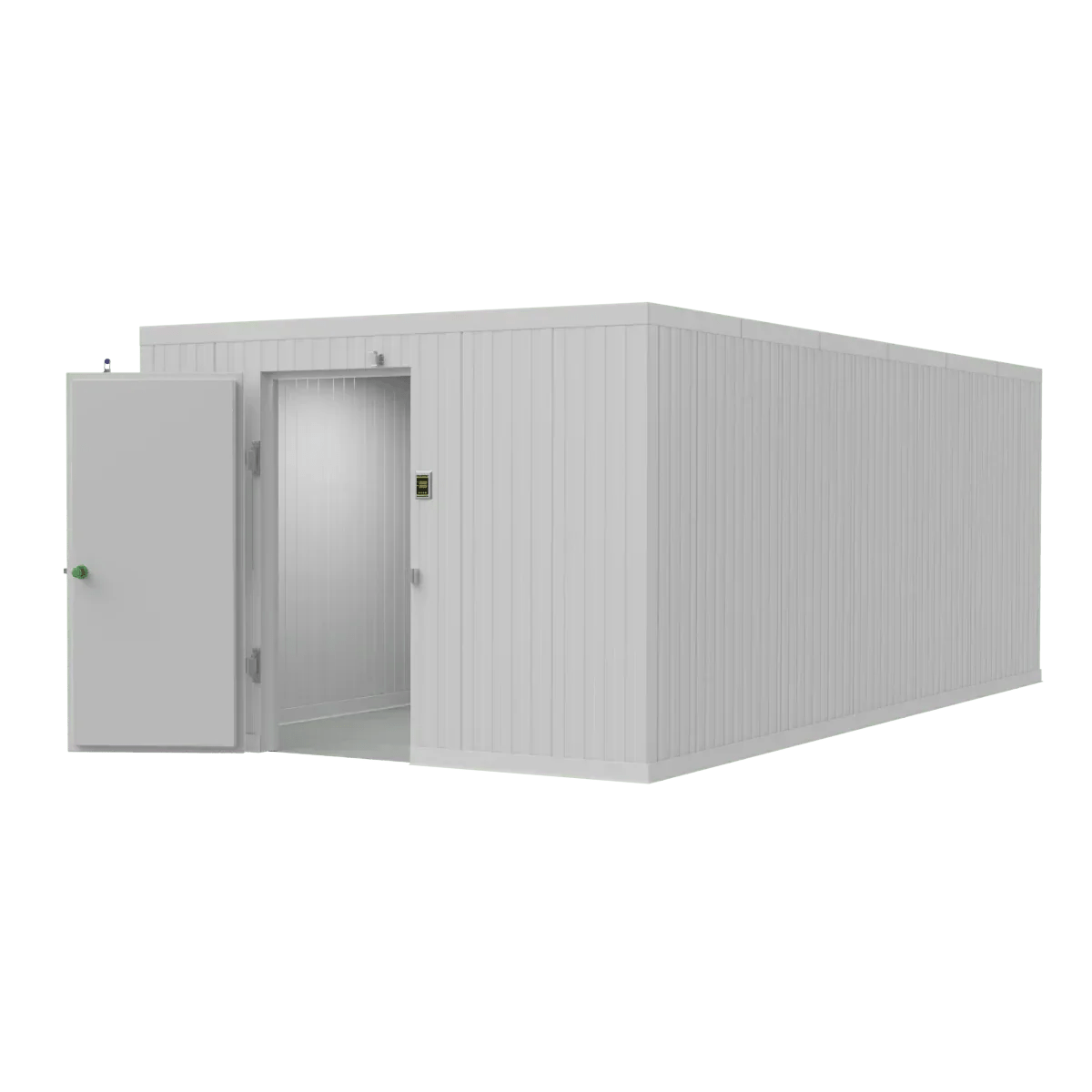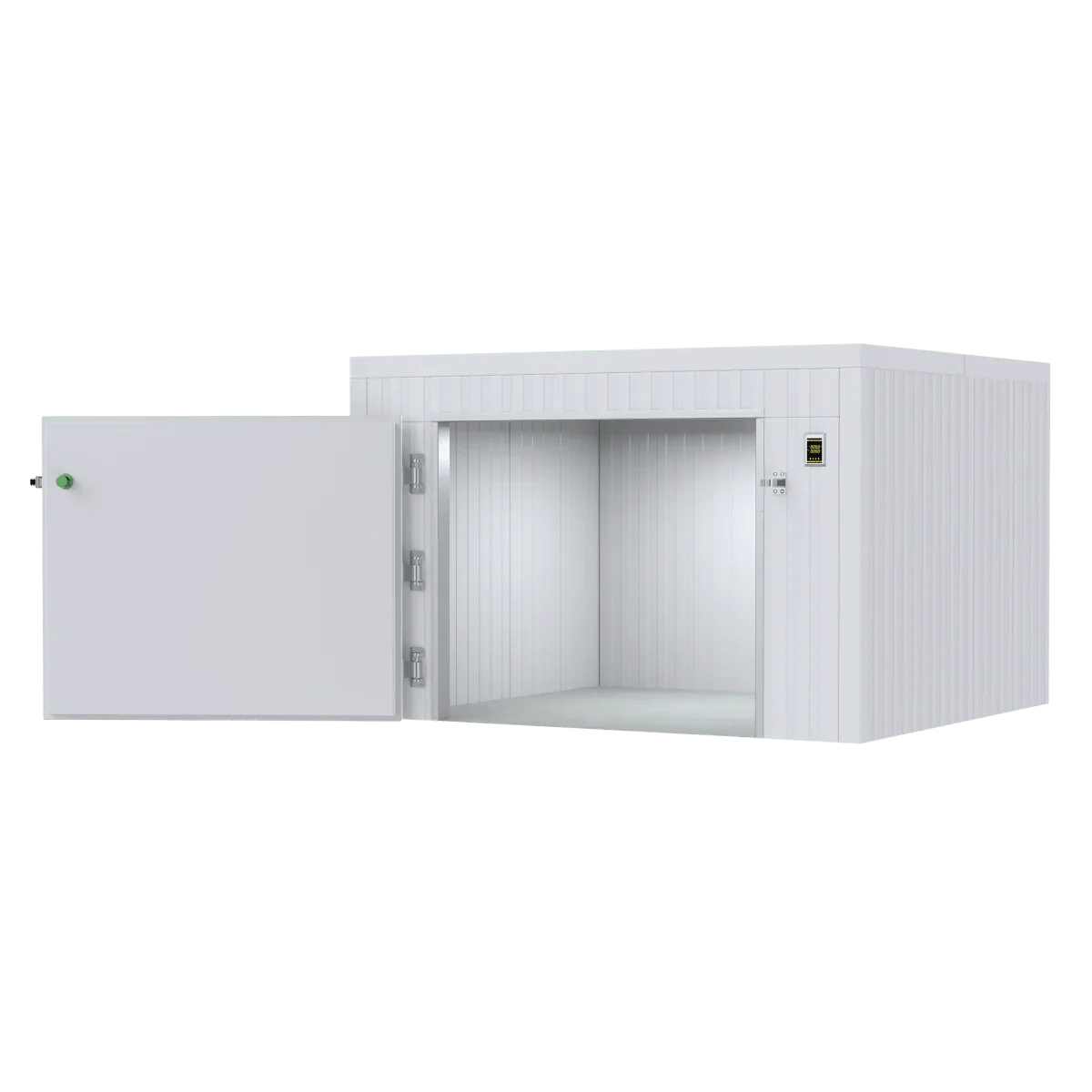Why Understanding Mortuary Morgue Facilities Is Critical for Funeral Directors
A mortuary morgue serves as the essential bridge between death and final disposition, providing temporary storage and preparation services for the deceased. When families face the loss of a loved one, understanding the difference between morgues, mortuaries, and funeral homes becomes crucial for making informed decisions during an emotionally difficult time.
Key differences between mortuary morgue facilities:
- Hospital Morgue: Temporary storage at +2/+4°C, autopsy services, forensic examination
- Mortuary: Body preparation, embalming, cosmetic care, viewing arrangements
- Funeral Home: Full-service planning, grief support, memorial services, burial coordination
- Crematorium: Specialized cremation services with optional viewing and memorial options
Most people hope to never encounter a morgue, yet it serves a crucial role in society by providing dignified storage during the critical period between death and final arrangements. Bodies in standard hospital morgues are typically stored at +2/+4°C (36–39°F), which slows but does not prevent decomposition, while forensic institutes may use negative temperature storage (−10°C to −50°C) for long-term preservation of unidentified remains.
The terminology can be confusing - morgues focus on storage and forensic examination, while mortuaries handle preparation and embalming services. Some funeral homes operate their own attached morgues, creating integrated facilities that streamline the entire process from storage through final services.
I'm Mortuary Cooler, a national-level mortuary cooler supplier with experience in providing refrigeration solutions for mortuary morgue facilities across the United States. My expertise in mortuary morgue equipment helps funeral directors understand both the operational requirements and the technology needed to maintain dignified care standards.
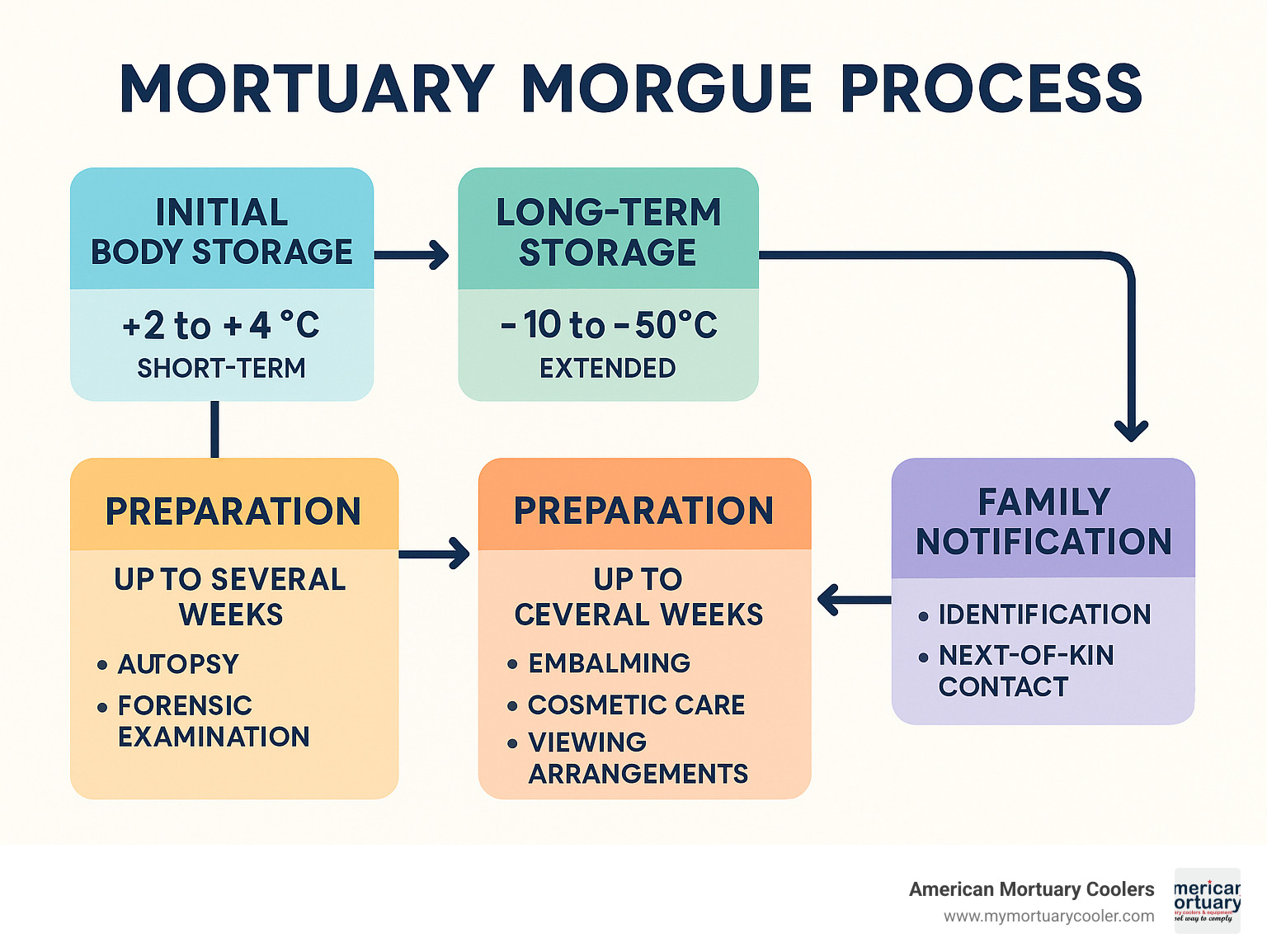
Quick mortuary morgue terms:
Understanding Morgue, Mortuary & Funeral Home Roles
When someone passes away, their body typically moves through several different types of facilities before reaching its final resting place. Each facility has a distinct role, and understanding these differences can help families make better decisions during difficult times.
The journey often begins at a hospital morgue, which serves as the temporary holding area immediately after death. These facilities focus on storage and identification, keeping bodies in refrigerated compartments while medical staff complete necessary paperwork and examinations. Hospital morgues originated from the need to maintain dignity and public health standards while families arranged for final services.
Mortuary morgue facilities handle the preparation phase. This is where bodies are embalmed, dressed, and prepared for viewing or final disposition. Think of mortuaries as the behind-the-scenes workshop where skilled professionals restore a peaceful appearance for families to say their final goodbyes.
Funeral homes provide the full-service experience that most families encounter. They coordinate everything from transportation and legal paperwork to memorial services and grief counseling. Many funeral homes operate their own attached mortuaries, creating a seamless experience from preparation through final services.
Some facilities specialize in autopsy and forensic examination, particularly in cases involving unexpected deaths or legal investigations. These specialized morgues work closely with coroners and medical examiners to determine causes of death.
Cultural customs also influence how these facilities operate. Different religious and ethnic communities may have specific requirements for body handling, preparation timing, and storage conditions that these facilities must accommodate.
Here's how these facilities compare in their primary functions:
| Facility Type | Main Function | Services Provided | Staff Specialties | Typical Location |
|---|---|---|---|---|
| Morgue | Temporary storage, autopsy | Identification, forensic examination, autopsy | Pathologist, morgue technician | Hospital, coroner's office |
| Mortuary | Preparation for disposition | Embalming, dressing, cosmetic care | Embalmer, mortuary assistant | Funeral home, stand-alone |
| Funeral Home | Full-service funeral planning | Viewing, ceremonies, grief support | Funeral director, counselors | Stand-alone, attached to mortuary |
| Crematorium | Cremation | Cremation, sometimes memorials | Crematory operator, staff | Stand-alone, funeral home |
Legal hold requirements can affect how long bodies remain in different facilities. Court orders, pending investigations, or family disputes may extend storage times, making proper refrigeration equipment essential for maintaining dignity throughout the process.
What Happens Inside a Hospital Mortuary Morgue?
Hospital mortuary morgue facilities operate under strict protocols to ensure dignity and legal compliance. When a body arrives, staff immediately place it in refrigerated drawers maintained at +2/+4°C (36–39°F). This temperature range significantly slows decomposition while allowing for identification and examination procedures.
Negative freezers operating at −10°C to −50°C serve special purposes in forensic cases. These ultra-cold units preserve unidentified remains for extended periods, sometimes months or years, while investigators work to establish identity or complete legal proceedings.
The identification process involves multiple checkpoints and documentation. Each body receives tags and tracking numbers that follow a strict chain-of-custody protocol. This system prevents mix-ups and ensures families receive their loved ones correctly.
Staff members include morgue technicians who handle daily operations, pathologists who perform examinations, and administrative personnel who coordinate with families and funeral homes. Everyone follows detailed procedures to maintain both dignity and legal compliance.
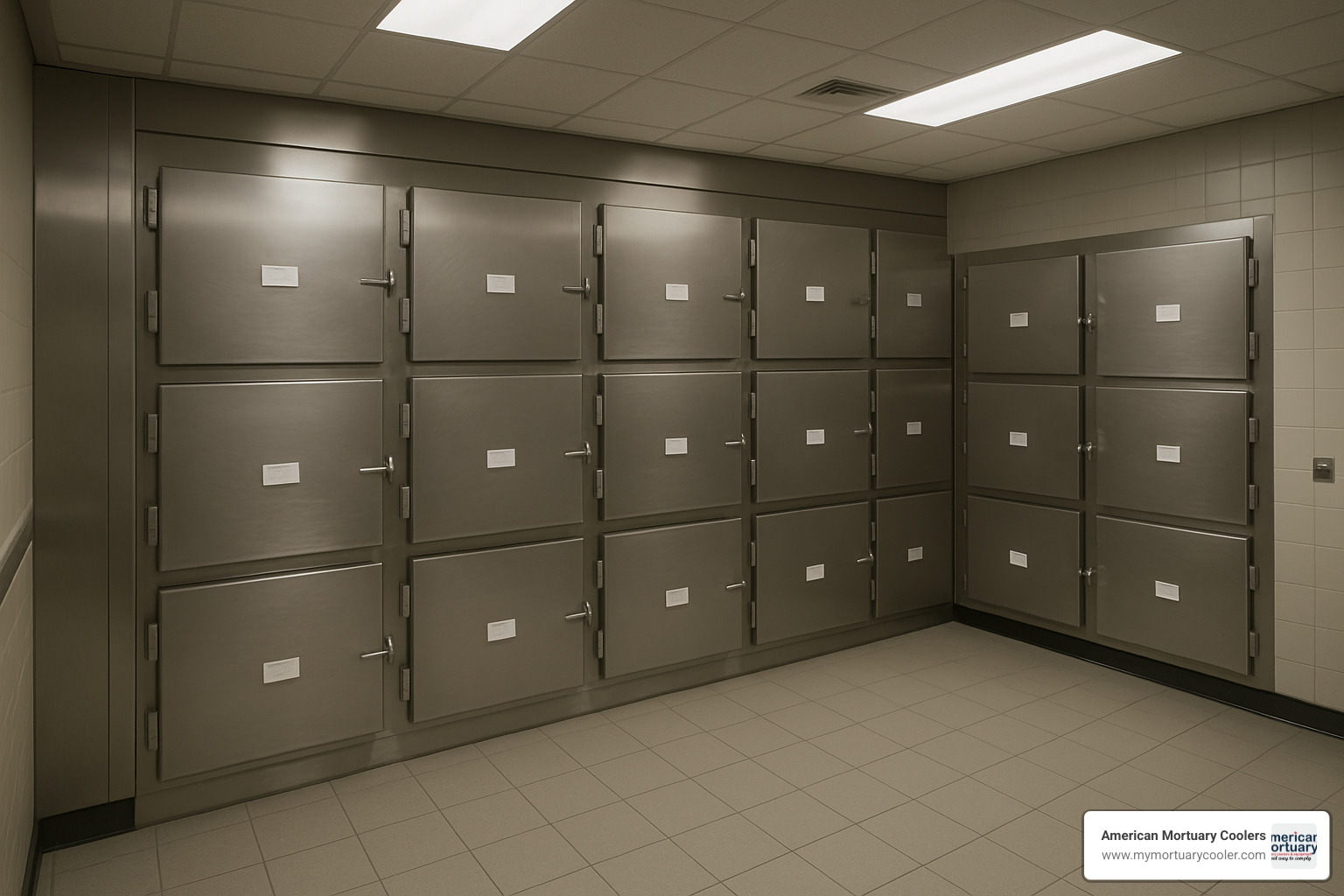
How a Mortuary Prepares for Viewing and Disposition
The embalming room serves as the heart of mortuary operations. Here, licensed embalmers use specialized chemicals to preserve bodies and create a peaceful appearance for families. This process becomes especially important when families plan open-casket viewings or need to transport bodies over long distances.
Dressing and cosmetic care requires both technical skill and artistic sensitivity. Mortuary staff work carefully to restore a natural appearance, applying makeup, styling hair, and dressing the deceased in clothing chosen by families. This attention to detail helps families remember their loved ones as they were in life.
Direct cremation has become increasingly popular as families seek simpler, more affordable options. This service bypasses embalming and traditional viewing, moving directly from storage to cremation. Many mortuaries now offer this streamlined approach alongside traditional services.
Grief support extends beyond technical services. Mortuary staff often provide emotional support, help families understand their options, and coordinate with clergy or counselors. The paperwork involved includes death certificates, permits, and coordination with cemeteries or crematoriums.
Modern mortuaries must balance efficiency with compassion, using professional equipment while maintaining the personal touch that families need during difficult times.
For detailed information about refrigeration technology, check out this complete guide to body fridges and mortuary refrigerators.
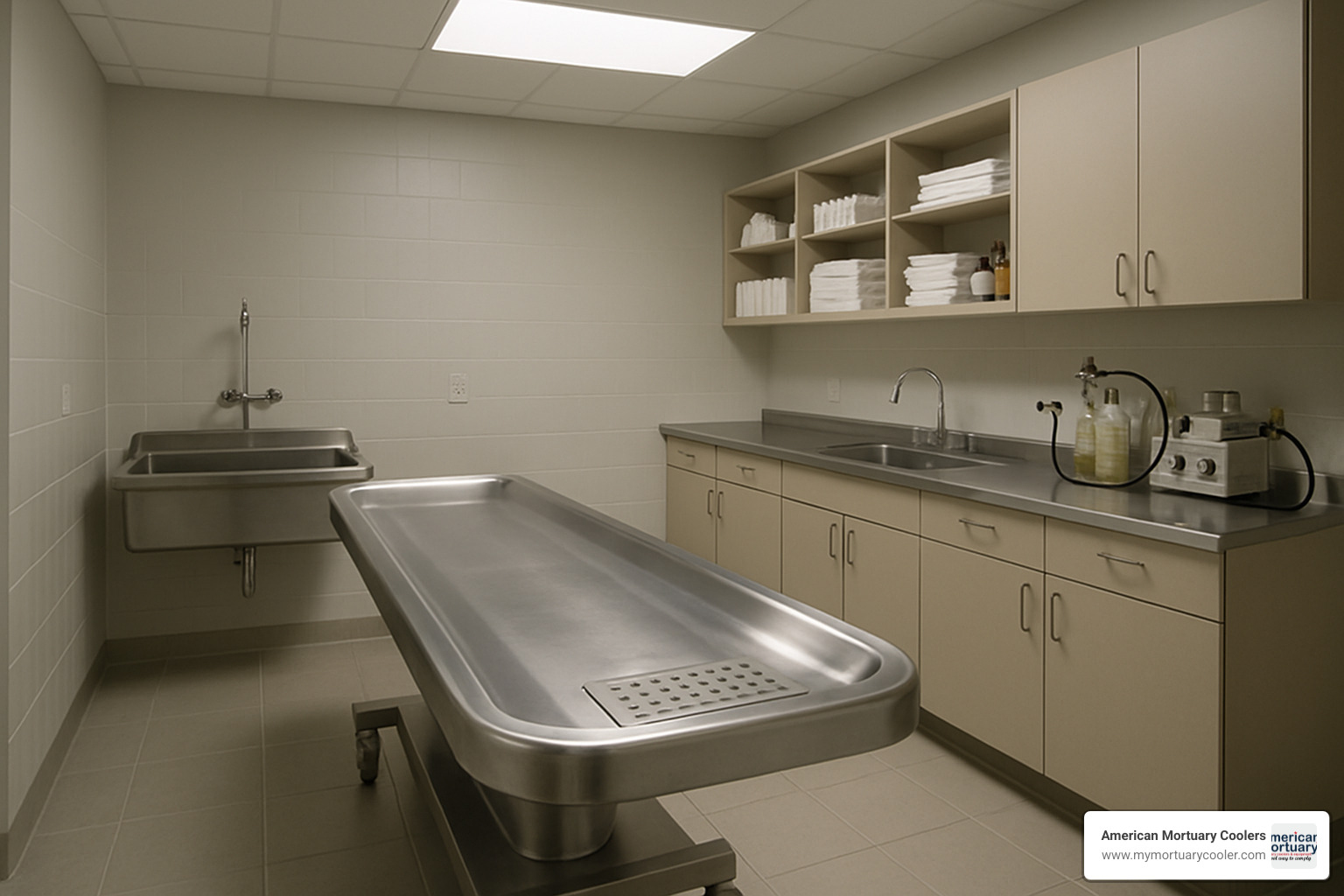
From Death Scene to Mortuary Morgue: Step-by-Step Process
When someone passes away, their body follows a carefully managed path that ensures dignity, legal compliance, and proper care. Understanding this process can help families know what to expect during an already difficult time.
The journey begins with pronouncement of death by a physician, coroner, or other qualified authority. This official declaration starts the legal and logistical process that follows every death, whether it occurs in a hospital, at home, or elsewhere.
Transport to the morgue happens next, typically to the nearest hospital mortuary morgue or forensic institute. This step is especially important when the cause of death is unclear or requires investigation. The body is handled with care and dignity throughout the transport process.
Coroner release and legal hold procedures determine what happens next. If an autopsy is needed—whether required by law or requested by the family—the coroner or medical examiner takes custody of the body. When no autopsy is necessary, the body can be released more quickly to a funeral home for preparation.
Temporary storage in refrigerated units is a crucial step that slows decomposition while preserving both dignity and any forensic evidence that might be needed. This storage period can last anywhere from a few hours to several days, depending on circumstances.
The autopsy decision is made based on legal requirements, suspicious circumstances, or family requests. These examinations are typically conducted in hospital or forensic mortuary morgue facilities by trained pathologists who can determine the cause and manner of death.
Family notification happens as soon as possible, allowing loved ones to begin making arrangements. Funeral directors often help coordinate this communication and start planning services.
Release to funeral home or mortuary marks the final step in this process. Once any legal requirements are satisfied and paperwork is complete, the body moves to a mortuary for final preparation, whether that's embalming for viewing or preparation for direct cremation.
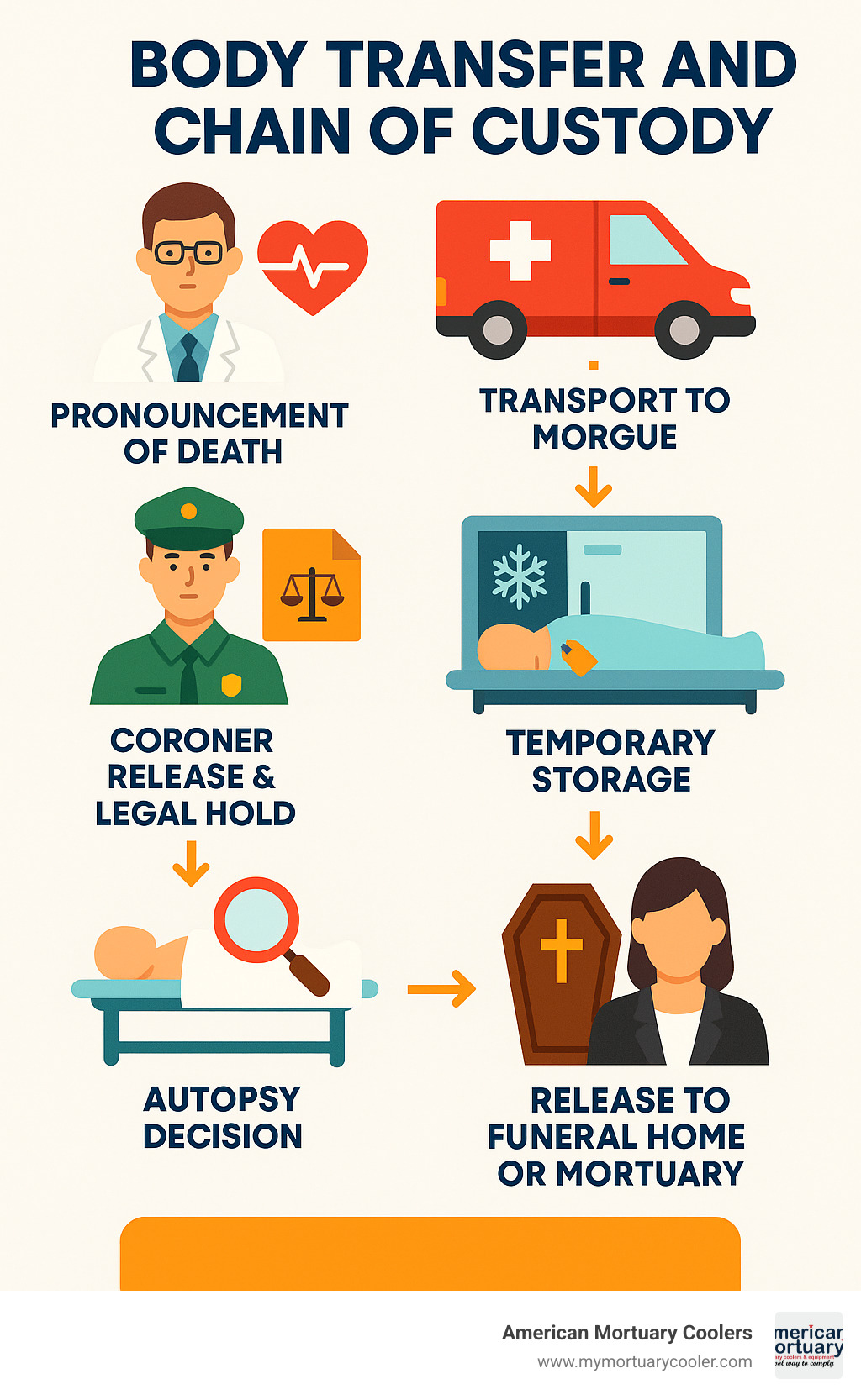
Storage & Preservation Technology
The technology behind mortuary morgue storage has come a long way, and frankly, it's pretty impressive stuff. At American Mortuary Coolers, we've seen how the right equipment makes all the difference in maintaining dignity and safety.
Walk-in coolers are the workhorses of modern morgues, allowing staff to efficiently store and access multiple bodies while accommodating special cases like bariatric situations. These spacious units make the difficult work of morgue staff much more manageable.
Roll-in racks and trays might not sound glamorous, but they're game-changers for safety and ergonomics. Moving bodies is physically demanding work, and these systems help protect both the deceased and the staff who care for them.
Bariatric bays deserve special mention because they're designed for larger bodies or those requiring special handling. Not every morgue has these, but they're essential for providing equal dignity to all individuals.
Backup power and temperature alarms are the unsung heroes of morgue operations. Modern facilities feature backup generators and sophisticated temperature monitoring systems with alarms that prevent any issues during power outages. Nobody wants to think about what happens when refrigeration fails.
Temperature management follows strict standards: +2/+4°C (36–39°F) for standard storage, while forensic labs may use deep freeze temperatures of −10°C to −50°C for long-term preservation of unidentified remains or complex cases.
Want the science behind all this? Check out scientific research on morgue refrigeration for the technical details.
Curious about the best cooler options for your facility? Our ultimate guide to morgue refrigeration equipment covers everything you need to know about choosing the right system.
Choosing the Right Mortuary Morgue Near You
Finding the right mortuary morgue for your community or loved ones goes beyond just picking the closest facility. You want a place that understands your needs and treats everyone with dignity and respect.
Location matters, but it's not everything. Having a facility nearby makes logistics easier, but you'll also want to consider transport routes and local regulations. Some cultural traditions require rapid burial, so understanding the facility's workflow becomes crucial.
Accreditation and licensing should be non-negotiable. Any reputable mortuary morgue will proudly display their credentials and maintain compliance with health codes. Don't hesitate to ask about their inspection records.
Capacity might not seem important until you need it. During public health emergencies or unexpected events, some facilities can become overwhelmed. Ask about their surge capacity and backup plans.
Religious and cultural accommodation can make all the difference for grieving families. Does the facility respect time-sensitive rituals? Can they work with specific dietary laws or preparation practices? These details matter deeply during difficult times.
Some mortuary morgue facilities offer viewing rooms for private family farewells, while others focus purely on operational functions. On-site cremation might be available if you're considering direct cremation services.
Security and privacy protect both families and dignity. Look for controlled access, proper record-keeping, and facilities that take confidentiality seriously.
Questions to Ask a Prospective Mortuary Morgue
When you're evaluating a mortuary morgue, don't be shy about asking the important questions. Start with licensing—is the facility properly licensed and regularly inspected?
Ask about their cooler temperature logs. Proper facilities maintain strict temperature controls and should be willing to discuss their monitoring systems. Find out about their autopsy policy—when is one required by law, and what options do families have?
Embalming requirements vary by state and situation, so understand when it's legally required versus optional. Get clear cost estimates for storage, preparation, and transportation fees upfront.
Storage time limits matter too. How long can a body remain in their care, and are there options for viewing or private family time?
Integrating a Mortuary Morgue & Funeral Services
Full-service facilities can streamline the entire process from storage through final services. Many funeral homes have hospital partnerships that create seamless transitions from the morgue to preparation areas.
Standalone morgues serve important roles too, especially for forensic cases or when families prefer to arrange their own ceremonies. They're also common for direct cremation services.
Transfer timing typically happens within 1–3 days, unless there's a legal hold for investigation. The best facilities coordinate these transfers smoothly, so families don't have to worry about logistics during an already difficult time.
Modern mortuary morgue facilities rely on integrated equipment solutions. At American Mortuary Coolers, we supply everything from refrigeration units to specialized transport equipment that makes these facilities run smoothly.
Need to know more about transport equipment? Read our guide to finding a morgue cart.
Costs, Services & Family Support
When you're already dealing with grief, the last thing you want is financial stress. Understanding mortuary morgue costs upfront helps families make informed decisions without surprises on the final bill.
Basic storage fees are typically charged per day at hospital morgues, ranging from $25 to $100 daily depending on your location. Extended storage or specialized deep-freeze preservation costs more, especially if legal proceedings delay release of the body.
Autopsy charges can be confusing. If the state requires an autopsy for legal reasons, it's usually covered by the county or state. But if your family requests a private autopsy for peace of mind, expect to pay $2,000 to $5,000 out of pocket.
Embalming costs average between $500 and $1,200, and it's often required by law if you're planning an open-casket viewing or transporting the body across state lines. Some families skip embalming entirely with direct cremation, which saves money while still maintaining dignity.
Don't forget about transport mileage fees—moving the body from morgue to funeral home isn't free, especially over long distances. Many facilities charge per mile, so choosing a local mortuary can keep costs down.
Package pricing is where smart shopping pays off. Full-service funeral homes often bundle storage, embalming, ceremony, and cremation services together, offering better value than paying for each service separately.
Financial assistance is available if money's tight. Ask about payment plans, community burial funds, veterans' benefits, or state aid for indigent burials. Many facilities work with families to find solutions rather than add stress during difficult times.
Grief counseling services are increasingly common at full-service facilities, recognizing that emotional support is just as important as physical care of your loved one.

Saving Money Without Sacrificing Dignity
Direct cremation remains the most affordable option, typically costing $1,000 to $3,000 total. No embalming, expensive casket, or elaborate ceremony required—just dignified care and cremation.
Minimal service approaches focus on what matters most to your family. Skip the extras like elaborate flowers or extended viewing hours if budget is a concern. The core services—respectful storage, basic preparation, and final disposition—can be done affordably.
Community funds exist in many areas specifically to help families with burial costs. Churches, civic organizations, and local governments often maintain emergency funds for exactly these situations.
Negotiate timing when possible. Shorter storage periods reduce daily fees, so making arrangements quickly can save money. However, never rush important decisions just to save a few dollars—reputable facilities will work with you on reasonable timelines.
Frequently Asked Questions about Mortuary Morgues
When families face the loss of a loved one, questions about mortuary morgue facilities naturally arise. Here are the most common concerns we hear from funeral directors and families navigating this difficult time.
How long can a body stay in a mortuary morgue?
The answer depends on several factors, but most bodies stay in morgue storage for a few days to two weeks. Standard mortuary morgue refrigeration at +2/+4°C (36–39°F) slows decomposition significantly, giving families time to make arrangements without rushing through important decisions.
Forensic cases tell a different story. When identification is needed or legal investigations are ongoing, bodies may remain in deep freeze storage at −10°C to −50°C for months or even years. These negative temperature units essentially pause decomposition, preserving evidence and allowing for future examination.
Hospital morgues typically encourage families to make arrangements within 72 hours to one week, while private mortuaries may offer more flexibility. That extended storage often comes with additional daily fees, so it's worth discussing timeline expectations upfront.
Who works inside a mortuary morgue and what are their roles?
The people working in mortuary morgue facilities are trained professionals who handle their responsibilities with both technical skill and deep respect for the deceased and their families.
Medical examiners and forensic pathologists are the doctors who conduct autopsies and determine cause of death. They're typically involved in hospital morgues and forensic institutes, preparing detailed reports that may be used in legal proceedings or to provide families with answers about their loved one's passing.
Morgue technicians (sometimes called dieners) are the backbone of morgue operations. They handle body intake, manage the refrigerated storage systems, assist during autopsies, and maintain meticulous records. These professionals ensure that every body is properly identified, stored, and tracked throughout the process.
Mortuary assistants and embalmers work in the preparation areas, focusing on making the deceased presentable for viewing and final services. They handle embalming, dressing, cosmetic restoration, and positioning in caskets—work that requires both technical training and artistic skill.
Funeral directors coordinate the entire process, serving as the primary contact for families. They manage paperwork, oversee transfers from morgue to mortuary, and ensure that all legal requirements are met while supporting families through their grief.
Can a funeral home operate its own mortuary morgue?
Absolutely! Many funeral homes—especially larger facilities or those in rural areas—maintain their own refrigerated storage units. This setup offers significant advantages for both the funeral home and the families they serve.
Having an on-site mortuary morgue allows funeral homes to provide seamless care from the moment they receive a body through final disposition. There's no waiting for transfer approvals, no additional transportation costs, and no coordination headaches between multiple facilities.
Rural funeral homes particularly benefit from this arrangement since they may be located far from hospital morgues or standalone mortuaries. Urban funeral homes often choose integrated facilities to reduce wait times and maintain complete control over the care process.
The refrigeration requirements are the same whether it's a hospital morgue or a funeral home's storage area—bodies must be kept at proper temperatures with backup power systems and monitoring alarms. That's where we at American Mortuary Coolers come in, providing custom refrigeration solutions that meet each facility's specific needs.
Some funeral homes start with basic refrigerated storage and expand to include full mortuary services as their business grows. Others partner with nearby mortuaries while maintaining their own temporary storage for busy periods or emergency situations.
Conclusion
When someone you care about passes away, the last thing you want to worry about is whether their remains are being handled with dignity and respect. That's where understanding mortuary morgue facilities becomes so important—and where American Mortuary Coolers steps in to support the professionals who serve families during their most difficult moments.
From our home base in Tennessee, we've spent years perfecting custom mortuary refrigeration solutions that funeral directors, hospital administrators, and community leaders can count on. Whether you're running a small family funeral home in rural Kentucky or managing a large hospital morgue in downtown Chicago, we understand that reliable equipment isn't just about temperature control—it's about preserving dignity and giving families the peace of mind they deserve.
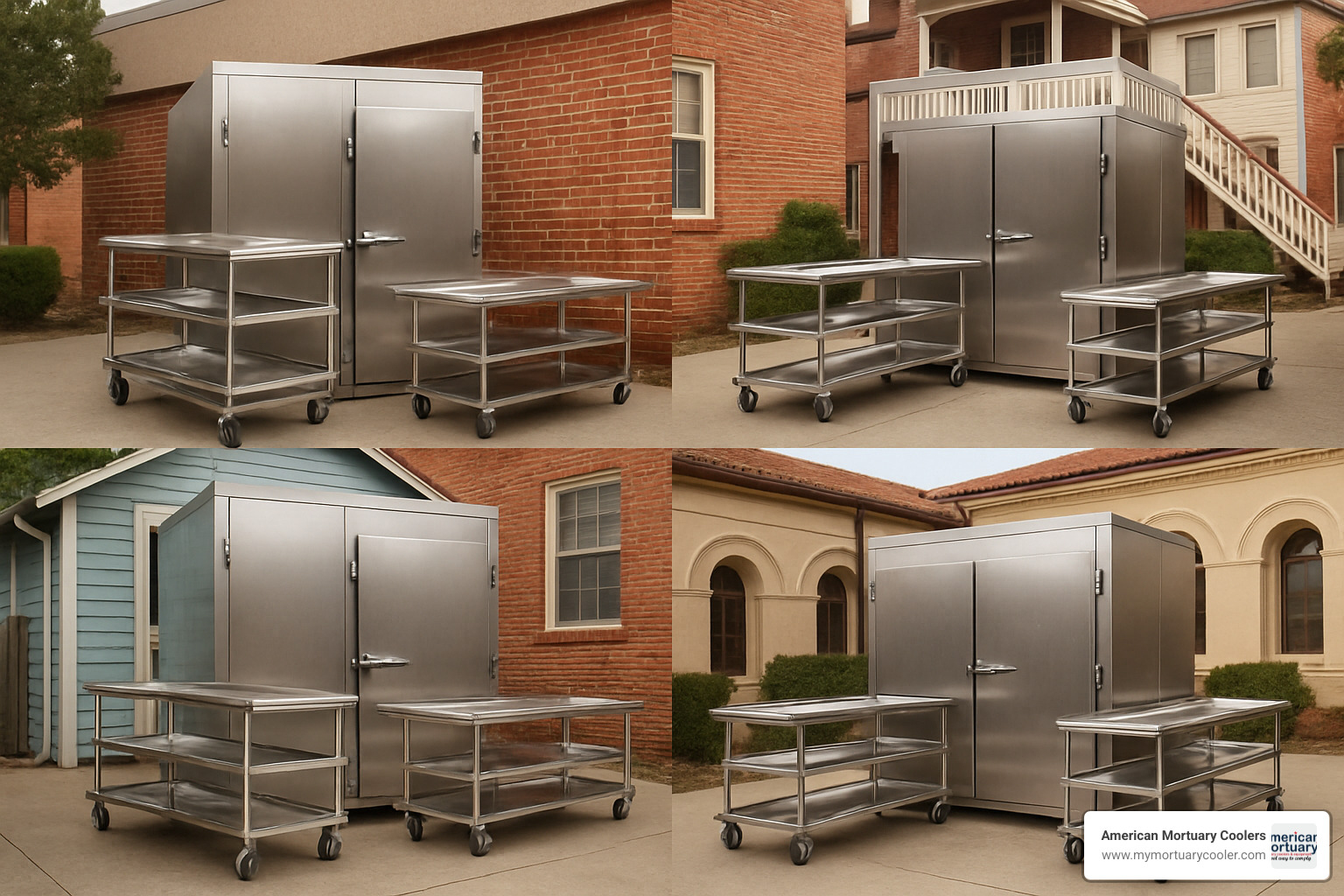
Our equipment ships directly to all 48 contiguous states because we believe every community—whether it's a busy city or a small town—deserves access to durable, professional-grade morgue refrigeration. We've seen how the right equipment can transform a facility's operations, making the work safer for staff and more respectful for the families they serve.
The funeral industry is built on trust, compassion, and attention to detail. When you choose American Mortuary Coolers, you're not just buying refrigeration equipment—you're partnering with a team that understands the weight of your responsibility. Every walk-in cooler we build, every body tray we deliver, and every service call we make is guided by one simple principle: helping you provide the best possible care when it matters most.
Planning for the future means having reliable partners you can count on. Whether you're expanding your current facility, opening a new location, or simply need to replace aging equipment, we're here to help you make informed decisions that serve your community well.
Ready to explore how we can support your facility? Check out our comprehensive guide to one-stop mortuary cooler solutions and find why funeral professionals across the country trust American Mortuary Coolers for their refrigeration needs.
For expert advice or to request a quote for your facility, contact American Mortuary Coolers—serving all 48 contiguous states with custom solutions and dependable service.
